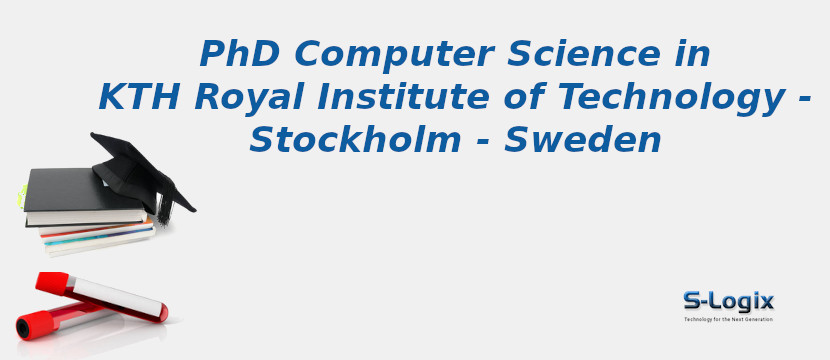KTH Royal Institute of Technology is a university in Stockholm, Sweden, founded in 1827. As one of the oldest technical institutions in Sweden and the largest in the Nordic countries, KTH Royal Institute of Technology is renowned for its research in science and technology.
KTH Royal Institute of Technology-s research and education programs are organized into nine schools, School of Engineering Sciences, School of Architecture and the Built Environment, School of Industrial Engineering and Management, School of Electrical Engineering and Computer Science, School of Information and Communication Technology, School of Biotechnology, School of Chemical Science and Engineering, School of Civil and Architectural Engineering, and School of Architecture.
Research at KTH Royal Institute of Technology focuses on a wide range of areas, including energy, materials, IT, biotechnology, communication, management, and architecture. Through its research, the KTH Royal Institute of Technology contributes to the advancement of new technologies that can deplete the environmental impact of energy production and raise the use of renewable energy sources.
Address: Brinellvägen 8, 114 28 Stockholm, Sweden
Phone: +46 8 790 60 00
Email: info@kth.se
Website: https://www.kth.se/en
• Computer Science and Engineering (Bachelor-s; Master-s; and Ph.D.)
• Data Science (Bachelor-s; Master-s; and Ph.D.)
• Software Engineering (Bachelor-s; Master-s; and Ph.D.)
• Computer Vision and Machine Learning (Bachelor-s; Master-s; and Ph.D.)
• Interactive Systems (Bachelor-s; Master-s; and Ph.D.)
• Computer Graphics (Bachelor-s; Master-s; and Ph.D.)
• Computer Networks (Bachelor-s; Master-s; and Ph.D.)
• Embedded Systems (Bachelor-s; Master-s; and Ph.D.)
• Programming Languages and Logic (Bachelor-s; Master-s; and Ph.D.)
• Computational Science and Engineering (Bachelor-s; Master-s; and Ph.D.)
• Information Systems (Bachelor-s; Master-s; and Ph.D.)
• Game and Media Technology (Bachelor-s; Master-s; and Ph.D.)
• Security and Privacy (Bachelor-s; Master-s; and Ph.D.)
• Computer Science Theory (Bachelor-s; Master-s; and Ph.D.)
KTH Royal Institute of Technology in Stockholm Sweden is renowned for its cutting-edge research in the field of computer science.
• Communication Systems
• Computational Science and Technology
• Decision and Control Systems
• Electric Power and Energy Systems
• Electromagnetic Engineering and Fusion Science
• Electronics and Embedded Systems
• Information Science and Engineering
• Media Technology and Interaction Design
• Micro and Nanosystems
• Network and Systems Engineering
• Robotics; Perception and Learning
• Software and Computer Systems
• Space and Plasma Physics
• Speech; Music and Hearing
• Theoretical Computer Science
Communication Systems:
• technical and economic aspects of wireless
• wired and optical communication systems and services
• fixed and mobile communication systems
• communication-related services, artifacts, applications
Computational Science and Technology:
• Computational Biology and Machine Learning in Biomedicine
• Biological Physics and Systems Biology
• Computational Brain Science
• Numerical Methods
• Parallel Computing
Decision and Control Systems:
• Control of Transport Systems
• Machine Learning
• Networked Control and Robotics
Information Science and Engineering:
• Research areas
• Intelligent transportation
• Information and coding
• Multimedia Communication
• Positioning and navigation
• Privacy and security
• Processing and learning
• Wireless networks
Media Technology and Interaction Design:
• Creative Media Technology
• Interaction Design
• Sound and Music Computing
• SPACE - Social, Physical, and Cultural Environments
• Technology Enhanced Learning
Micro and Nanosystems:
• Biomedical Microtechnology
• Micro and Nanofluidics
• RF Microwave and Terahertz Microsystems
• NEMS & Nanosystems
• Organ-on-a-Chip & Cell Models
• Photonics
• Sensors
Network and Systems Engineering:
• Stochastic modeling
• Queuing theory
• Game theory
• Optimization
• Distributed systems
• Data analysis
• Machine learning
• Software design, prototyping, and experimentation
Robotics, Perception, and Learning:
• Active Perception
• Computer Vision and Machine Learning
• Grasping and Manipulation
• Mobile Robotics
• Planning and Decision Making
• Social Robotics
Speech, Music, and Hearing:
• Conversational Systems
• Human Speech and Communication
• Music Informatics and Auditory Perception
• Speech and Language Technologies
• Social Robotics
• Voice Science and Technical Vocology
Theoretical Computer Science:
• Software engineering
• Computer security and privacy
• Cryptography, verification, and sat solving
• Natural language tools
• Computer science education
• Algorithms, Logic, and Graphs (ALG) Research Laboratory
• Autonomous Systems and Software Lab
• Centre for Autonomous Systems
• Centre for Information Technology and Media (ITM)
• Computer and Systems Sciences (DSV)
• Computer Science and Communication (CSC)
• Database Technology Institute (DBTI)
• Research Centre for Computer Security (RCS)
• Software Verification and Validation Lab
• Spoken Language Systems (SLS)
• Research centers and research infrastructure
• Centre for Autonomous Systems
• Castor Software Research Centre
• Center for Cyber Defense and Information Security
• Digital Futures
• Electrum Laboratory
• NAVET - KTH Centre for Research in Art, Technology, and Design
• PDC Center for High Performance Computing
• The Sustainable Power Laboratory
• VIC Studio
• KTH Royal Institute of Technology International Fellowships
• European Research Council Grants Swedish Research Council Grants
• KTH International Student Scholarships
• KTH Global Mobility Grants
• Swedish Institute Study Scholarships
• KTH President-s Awards
• KTH Mobility Grants
• Swedish Institute Talent Scholarships
• KTH Excellence Scholarships
Funded projects in computer science at KTH Royal Institute of Technology - Stockholm - Sweden, are
• Smart and Autonomous Systems: A Platform for Research, Education, and Innovation
• Social Robotics
• AI-Supported Cloud Computing
• Interactive Visualization for Knowledge Discovery
• Machine Learning for Big Data Analysis
• Autonomous Agents for Autonomous Systems
• Security for the Internet of Things
• Autonomic Computing for Energy EfficiencNext-generation Human-Computer Interaction
• Secure, Intelligent, and Autonomous Networks
• Natural Language Processing for Autonomous Agents
• Augmented Reality for Collaborative Interaction
• Artificial Intelligence for Autonomous Systems
Admission requirements for Ph.D. computer science at KTH Royal Institute of Technology - Stockholm - Sweden
• A completed Bachelor-s degree or equivalent in Computer Science or a closely relevant field with a minimum grade of B+
• Strong proficiency in English, with a minimum score of 6.5 in IELTS
• A valid passport or another acceptable document
• Evidence of financial resources
• Personal statement
• CV
• Application fee
• Official transcripts
